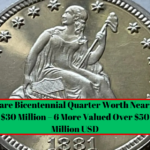In 1943, the U.S. Mint made a critical decision to conserve copper by minting pennies from steel, which was a critical decision during World War II. This change resulted in the creation of a distinctive coin, the 1943 Steel Wheat Penny, which is distinct from the standard copper pennies that have been produced since the late 1800s. Although over one billion of these steel pennies were produced, a few rare variations and errors have rendered certain coins exceedingly valuable, with prices reaching as high as $1.7 million. In this article, we will investigate seven of the most elusive 1943 steel wheat pennies and provide a detailed explanation of how to ascertain whether you possess one of these highly valued coins.
Why Were 1943 Steel Pennies Manufactured?
In 1943, the U.S. Mint supplanted copper with zinc-coated steel to facilitate the preservation of copper for the war effort, particularly for munitions. Nevertheless, the steel quarters posed obstacles. Due to their silvery appearance, they were occasionally misidentified as dimes and were susceptible to corrosion. Consequently, the Mint resumed the use of copper in 1944.
Three facilities—Philadelphia, Denver, and San Francisco—produced these 1943 steel pennies. Certain coins have become exceedingly valuable as a result of minting errors and other uncommon attributes, despite their extensive production.
Top 7 Rarest 1943 Steel Wheat Pennies
The following seven coins are highly sought after and rare due to their historical significance, unique errors, and mint marks, despite the fact that the majority of 1943 steel pennies are not worth more than their face value:
1. 1943 Bronze Penny
Value: Up to $1.7 million
Mint Marks: Philadelphia, Denver, San Francisco
Details: This coin is a rare mistake, struck on leftover bronze planchets instead of steel. Fewer than 20 are known to exist, making it one of the rarest U.S. pennies.
2. 1943-S Steel Penny (MS68 Grade)
Sold for: $19,200 (2021)
Mint Mark: San Francisco
Details: A nearly perfect, high-grade example from the San Francisco Mint. Its rarity is amplified by its “S” mint mark and pristine condition.
3. 1943-D/D Repunched Mint Mark
Sold for: $18,800 (2012)
Mint Mark: Denver
Details: This penny features a repunched “D” mint mark, where the mint mark was struck twice. Such minting errors significantly increase the coin’s value.
4. 1943-S Double Die Obverse (DDO)
Sold for: $9,500 (2004)
Mint Mark: San Francisco
Details: Double die obverse (DDO) errors occur when the coin’s design is struck twice, creating a noticeable double image. A high-grade example sold for nearly $10,000.
5. 1943 Steel Penny Struck on Dime Planchet
Sold for: $9,200 (2009)
Mint Mark: San Francisco
Details: This rare error occurred when a steel penny was struck on a dime planchet, making it smaller and unique. An AU53-grade example fetched over $9,000.
6. 1943-D Steel Penny (MS68)
Sold for: $6,600 (2019)
Mint Mark: Denver
Details: In pristine MS68 condition, this Denver-minted steel penny commanded $6,600 at auction, prized for its flawless surface and sharp details.
7. 1943-S Steel Penny (MS68)
Sold for: $5,400 (2015)
Mint Mark: San Francisco
Details: Another high-grade example from the San Francisco Mint, its rarity stems from both the condition and the lower mintage compared to Philadelphia.
Identifying a Rare 1943 Steel Wheat Penny
If you suspect you have a rare 1943 steel wheat penny, follow these steps to confirm its value:
Check the Mint Mark: Look for a “D” (Denver) or “S” (San Francisco) under the year “1943.” Philadelphia coins do not have a mint mark.
Magnet Test: Use a magnet to verify the coin’s composition. Steel pennies will stick to the magnet, while bronze ones will not.
Look for Errors: Search for signs of double die strikes, repunched mint marks, or incorrect planchet errors. These features can greatly enhance the coin’s worth.
Evaluate Condition: Coins in mint condition, with sharp details and minimal wear, are significantly more valuable than worn or circulated coins.
The 1943 steel wheat penny, despite being mass-produced, holds a special place in numismatic history.
While most are not worth more than their face value, a select few rare variants can fetch extraordinary sums at auction. If you happen to own a 1943 penny, it may be worthwhile to have it professionally appraised. Who knows? You might be holding a million-dollar treasure.
FAQs:
How many 1943 steel pennies are there?
Over a billion were produced, but only a few rare ones are highly valuable due to errors or being struck on bronze planchets.
Are all 1943 steel pennies valuable?
No, most are only worth face value, but those with errors or in high-grade conditions can be quite valuable.
How can I tell if my 1943 penny is bronze?
Perform a magnet test. If it doesn’t stick to a magnet, it may be a rare bronze penny.



